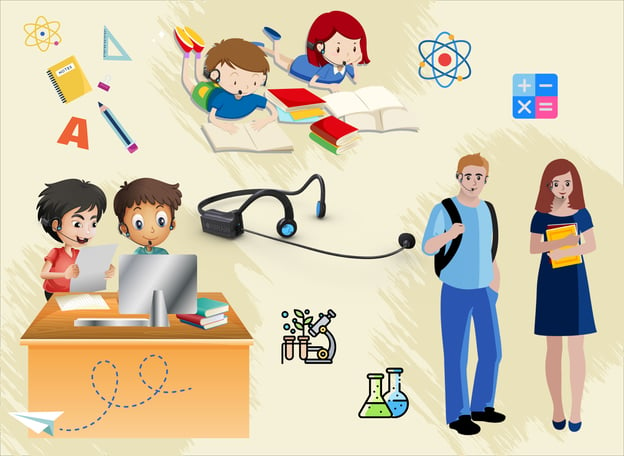In order to effectively tackle the rigors of a full-fledged academic year and to facilitate the most optimal learning environment, it is important to have a clear comprehension of the various cognitive aspects of the learning process.
As schools around the world gradually begin the new academic year, there is a sense of excitement among students, parents and teachers. With institutions deciding to adopt a mix of online learning and traditional classroom teaching for the foreseeable future, everyone involved has to work together towards their goals for the new year.
In this post, we will elaborate on the most essential facets namely attention, memory and language.
It is crucial for parents and teachers alike to focus on these three components as they have a domino effect on emotional intelligence, social skills, and behavioral traits in children and students.

1. Attention
One of the very foundational aspects of the learning process for a student is the ability to be attentive. Attention is vital for a student in order to absorb information, focus their mind on a task and controlling emotional outbursts. Lack of concentration and focus can lead to inability to complete an assignment or daydreaming. At a time when online classes have become the new normal, it is imperative that the parent or the instructor structure the lessons in a way that resonates with students and not let their minds drift away.
Relate Charles Dickens' A Christmas Carol, for example, to the significance of human values and familial relationships. Open a line of dialogue with them and seek active participation from their end by getting them to voice out their thoughts and perspective on the subject matter of the text. The form of a give and take mechanism can keep the child attentive while also enabling them to actively contribute to the learning environment. Encourage students to also take breaks and move around (no iPhones or iPads during this time though! 😎) as they might tune out or get distracted.
2. Memory
We use memory systems like short-term memory and long-term memory to help receive, file and retrieve information. As a student delves into an array of subjects like math, language, or a foreign language, they are expected to remember information in those subjects in significant detail. They would need to understand concepts behind mathematical equations and sometimes commit them to memory. Sometimes, students might face difficulty in doing exactly that. This is why teachers and parents who oversee a student's online class or an assignment would need to repeat instructions both orally and on text.
This repetitive process can be helpful for a child as it would ultimately help improve their reading comprehension skills and enable them to perform better in assessment tests. You could also create mind maps of several ideas and how they resonate with each other. Establishing connections between words and subjects enable students to engage with the material better and develop an enhanced understanding of the topic at hand.
3. Language and Speech
Our language processing skills aid us in our development in several different ways, the most important being our abilities to read, write, listen and speak. Issues with speech and language in children sometimes lead to failure in expressing emotions, communication and building and maintaining relationships.
If a child has issues with language processing, lessons should be structured in a way that it does not overly strain the child mentally. Classes can be interspersed with frequent breaks and down periods. Using different forms of visual communication like pictures and videos can be innovative ways of working with children and keeps them engaged.
How can Forbrain help?
Forbrain's underlying technology of bone conduction and gating allows the user to get instant, amplified feedback of their own voice and reinforce the three essential learning components of attention, memory, and language.
Encourage students to wear their Forbrain headsets while studying or practicing the multiplication table for example. By hearing their voice more clearly while wearing Forbrain, students are more aware of their pronunciation, their tone, their rhythm, and very quickly improve their oral speaking, language, and reading comprehension skills. They are focused not only on their own voice but also on the content of what they are trying to learn. They memorize their lessons better with a heightened sense of attention and concentration.
Learning by talking out loud and wearing the Forbrain headset for 10-20 minutes a day helps the child’s brain to be more aware and receptive to the message thereby enabling them to learn quickly and perform better academically.

.png?width=1900&name=blog_banner%20(1).png)


